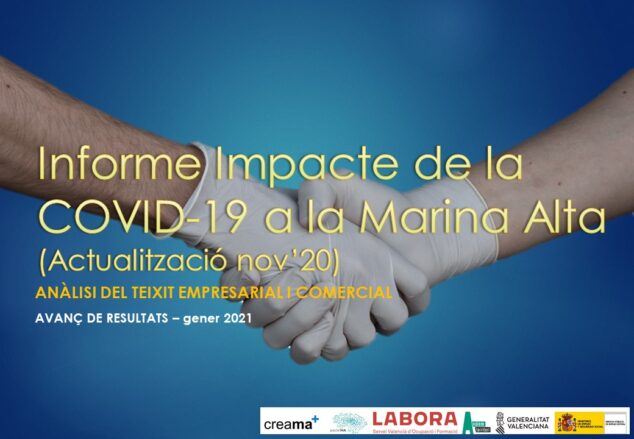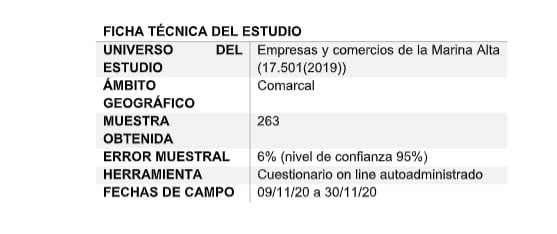PACTE'MA through Creama has published the second report on the socioeconomic impact of COVID-19 in the Marina Alta. This document is available through the Sectorial Reports page of the website of the 'Observatori Marina Alta.
This is the second report that is carried out with the aim of monitoring the evolution of this exceptional situation within the business and commercial fabric of the region to be able to assess the real impact of the crisis in the short, medium and long term caused by COVID-19 in this group and in society, in general, in the Marina Alta.
At the beginning of the first state of alarm decreed (April 20), CREAMA launched a questionnaire to find out how the crisis caused by the covid-19 pandemic was affecting companies and businesses in our territory. With the participation of the commercial and business network of the Marina Alta, it was published a study where the socioeconomic impact of the measures established with the declaration of the state of alarm was analyzed.
Second study after the pandemic
With the passing of the summer campaign and with the new measures being adopted by the competent authorities, a new questionnaire was launched in November to the entire business fabric of the region so that we
send their opinions on how companies and businesses are supporting this exceptional situation and their impressions for the nearest future.
All the information collected through these studies will serve to reorient the actions to promote local development and the activity in the region carried out by CREAMA as the technical secretariat of PACTE'MA, within the Marina Alta Strategy project, subsidized by the GVA to through Works.
In order to obtain results, an online methodology was chosen through a web link to a form that was sent to participating companies through the different local development agencies belonging to CREAMA and the different business associations of the Marina Alta. , which has made it possible to achieve a high level of significance and representativeness.
When comparing the results of the two waves, the timing of the two must be taken into account, which will allow a more accurate reading of the differences observed in the analyzes reflected in this document.
While the field work of the first wave (May '20) was concentrated in the last 2 weeks before entering Phase 1 of the de-escalation, when the first relaxation of the State of Alarm measures had not yet been implemented, the The survey phase of this wave (November '20) has been carried out in a “new normal” stage where efforts are being focused on balancing health measures with the economic recovery of the different sectors.
Knowing this, we can highlight the following relevant considerations on the current state of the impact of Covid-19 on the business and commercial fabric of the region.
The situation remains negative, although it has improved compared to May. Thus, we have gone from 92% (May '20) to 79% (Nov'20) of companies that affirm that the situation caused by Covid-19 has negatively affected them. Furthermore, 18% now say that it has not affected them, while in May this percentage was only 5%.
These data can be explained by the fact that respondents who claim to have closed the business decrease by 2 percentage points –from 15% to 13% - as well as a slight decrease in expenses –from 4% to 3%. reduce
expenses- and sales increase –from 3% to 4% -. We insist, the situation is still negative -4 out of 5 companies have reduced their sales-; however, the perception is of improvement compared to the beginning of the crisis.
10% of the companies in the Marina Alta close due to the health crisis
Regarding the current employment situation of the company, it stands out that while, in May, 43% were inclined towards a complete closure of the activity, now it represents only 10%, and that, as we have already mentioned, in the In the first wave, restrictions on economic activity were much more restrictive than they are today and discouragement was greater.
Another piece of data that reflects this positive trend is that 45% of the sample indicates that work activity remains normal, without notable variations, while in May it was only 21% of the total.
To date, 8 out of 10 businesswomen in the Marina Alta have had to make some change in the development of their economic activity. Regarding the May wave, a greater generalization of this need is observed (around 70% have carried out changes in May); logical, on the other hand, if we take into account the greater activity during the current period compared to that experienced during the state of alarm.
80% of the companies in the region claim to be affected by the Covid-19 situation
Thus, we have that more than 80% have adapted their company / business with preventive health measures, almost half have reduced working hours, and around 35% have had to carry out more advertising, reorient their strategy, or incorporate non-face-to-face methodologies.
Regarding the implementation of Teleworking, the fact that, in 6 out of 10 companies in the Marina Alta, this option is not possible remains decisive. Of the remaining 40%, where this type of work is applicable, 83% have implemented it to a greater or lesser extent, and half have done so for their entire workforce.
However, among the difficulties in implementing this work modality, emphasis is placed more intensely on the same problems as in May. The business and commercial sector is more critical of the crisis management carried out by public administrations in this second wave compared to May. Again, the Government is the worst valued and the municipalities the best valued public institution.
Around 6 out of 10 companies or businesses claim to know some measure provided by the Government, the Generalitat Valenciana or City Councils.
We have practically the same knowledge of the measures adopted as in the May wave, with the exception of local measures, which increase their degree of notoriety from 49% to 63%. More than half of the sample affirmed in both waves that it was difficult or very difficult for them to access and / or understand the different regulations that are published by these entities.
With regard to CURRENT MOMENT, the business and commercial fabric stands out in this wave that aid is not needed in such measure in the implementation of health security measures and they do highlight the need for financial aid - either in economic public aid, access to credits or to accessible bank financing-, flexibility in the payment of taxes, or programs that promote the activity. With the difference that in this new phase they require it by more than 70%, compared to 50% in May.
Looking to the FUTURE, the vision continues to be pessimistic and the main concerns related to problems regarding the economic viability of the company or business remain, which persist at the present time - reduction of sales / income, stoppage of activity / closure of the business, and liquidity problems- (in both waves they add up to around 70%).
In this second wave, the problems of facing compliance with the payment of wages in the labor market diminish, to the prejudice of an increase in the freeze on salary increases and hiring, together with a greater number of dismissals.
Regarding the role that both public and private institutions must adopt when facing a rapid economic recovery in the sector, once again, as a main factor, they request, among others, effective public aid that reaches everyone and / or condone or lower taxes, but unlike in May, in this new phase, half of the sample stands out both proposals, while in the first wave it only reached 37%.
Next, aspects for a speedy recovery now stand out through more facilities for access to credit, promotion of local consumption, more information to mitigate society's fear of covid-19, and greater promotion of tourism.
Finally, among the actions that you can take as a company or business that help to recover your business in the short term, are promotional campaigns, offers and discounts, along with changes in commercial strategy to
favor of adaptation to new business models (digitization or online sales, home sales, ...).
On the other hand, another consideration to take into account is the very fact of resisting the economic consequences of the pandemic with a greater will and effort at work together with a reduction or control of costs. With regard to the client, the actions aimed at providing security with the adaptation of sanitary measures in the business, offering a quality product and / or service and providing payment and schedule facilities to clients is another of the strategies to consider counts in helping your recovery.
These are the main conclusions drawn from the opinions and data collected in the second investigation on the socioeconomic impact of the crisis caused by the Covid-19 pandemic in our territory. The full report can be downloaded in the "sector reports" section of the web
www.observatorimarinaalta.org








